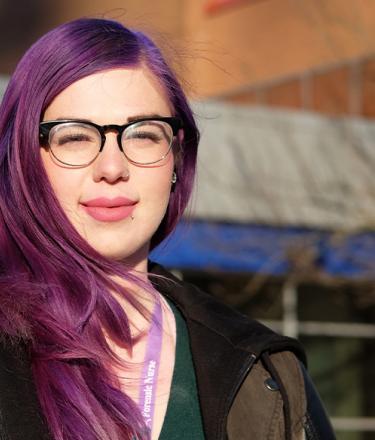-

The future of health care looks a lot like Sam King
She’s young, driven, and community-minded. Self-aware and embracing her vulnerability, Sam King shares in the tough moments with patients – or people, as she says – humanizing those she cares for.
At just 27 years old, Sam is trained as a registered nurse and sexual assault nurse examiner. She also has training in cognitive behavioral therapy, dialectical behavioral therapy for highly suicidal individuals, acceptance and commitment therapy and prolonged exposure therapy for post-traumatic stress disorder. She feels grateful for the opportunities her home province has provided and is passionate about giving back to her community.
Patients come to the inpatient mental health unit at the QEII for acute care. Professionals like Sam help to stabilize the person, create a plan for them moving forward and then they integrate back into the community.
“You’re with that patient when they’re having the worst day of their life. On one hand you get to be that person who’s really supportive for them, you’re helping them get through a really painful time in their life,” she says, “but you sometimes see some folks, and then never see them again. Some folks are able to discharge themselves if they aren’t a threat to themselves or anyone else. You never really know what happens after they leave,” she says.
Sam says one of the biggest challenges for her has been practicing acceptance of what she can do to provide excellent care, while patients are in her care.
“What I can control is my interactions with folks – doing the best I can to provide care, getting to know their story and allowing them to have a safe environment to show up and be themselves – no matter what kind of day they’re having,” she says. “I feel good leaving knowing I gave it my all, I did everything I could for those folks and they got the best care that they could,” she says.
As part of her role as a sexual assault nurse examiner, Sam responds to cold calls at the QEII’s emergency room. Often she is the first point of contact for these patients.
When asked how her work affects her emotionally, Sam was quick to say “We’re humans, we’re not perfect. We definitely have emotions and definitely feel things when folks come in to tell their stories. At the same time that’s normal – if we show emotion, if we connect with the person, it’s healthy.”
“If someone is telling me about a loss I don’t say ‘I’m sorry to hear that’ I say ‘I’m sad to hear that’ because it is sad,” she says. “I encourage people to experience their emotions. It’s not healthy to bottle things up. I do the same personally, I name what’s happening and we support each other as a team.”